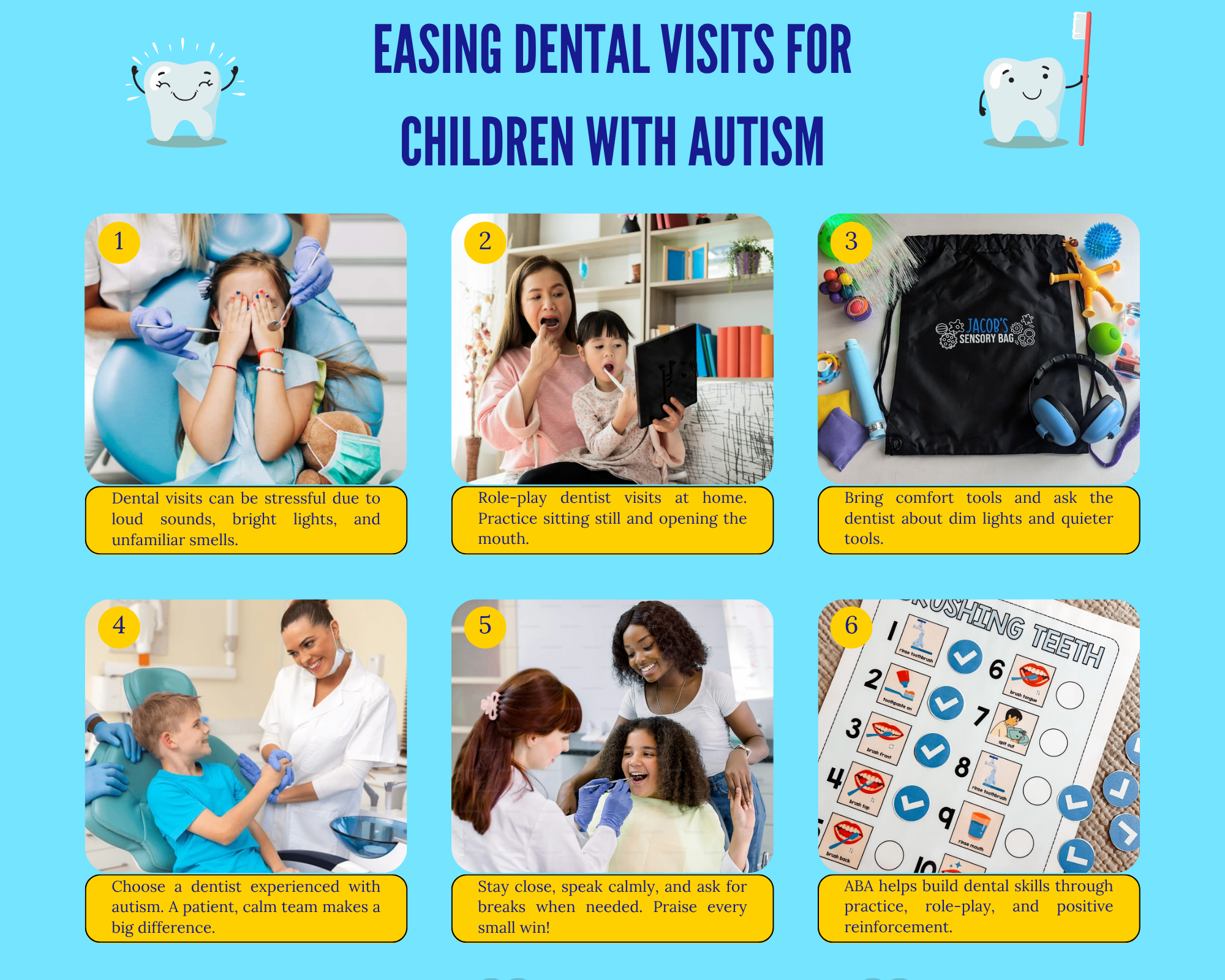How ABA Therapy can Support Children Diagnosed with ASD be Successful at the Dentist
Create a custom storybook or visual schedule that outlines the dental visit experience. Include steps like waiting, sitting in the chair, and opening the mouth. Visual preparation can reduce anxiety and help children with autism understand what to expect.
.png)
Why Are Dental Visits Challenging
for Children with Autism?
Children between the ages of 1 and 10 with autism spectrum disorder may find dental environments distressing due to:
- Bright examination lights
- Loud or high-pitched equipment sounds
- Unusual tastes and smells
- Anxiety about new environments and unfamiliar people
- Difficulty expressing discomfort
Understanding these autism dental care challenges is the first step in helping your child feel more comfortable at the dentist.
Autism Dental Care Tips to Prepare in Advance

1. Use Social Stories and Visual Aids
Create a custom storybook or visual schedule that outlines the dental visit experience. Include steps like waiting, sitting in the chair, and opening the mouth.
Visual preparation can reduce anxiety and help children with autism understand what to expect.
2. Practice at Home
Role-playing a dentist visit at home can be incredibly effective. Practice actions like brushing, reclining in a chair, and holding still.
Use a toy dental mirror to simulate the exam.
3. Prepare for Sensory Sensitivities
Talk to your dentist ahead of time about your child’s needs. Some dental clinics offer:
- Dimmed lighting
- Low-noise equipment
- Shorter waiting times
- Flexible appointment scheduling
You can also bring items like noise-canceling headphones, fidget toys, or sunglasses to help your child manage sensory overload.
Just like doctor visits, dental appointments can be stressful for children with ASD. Here are some additional tips on helping your child succeed at the doctor.
4. Choose a Dentist Experienced with Autism
Look for dental professionals trained to work with children with autism spectrum disorder.
They are often more patient and better equipped to explain each step in a calm and understanding way.
5. Schedule Strategically
Plan appointments when your child is well-rested, like early in the day or after a nap. Avoid times when they are likely to be hungry, tired, or overstimulated.
During the Visit: Tips for a Smooth Experience
1. Stay Close
Your presence can be very calming. Sit beside your child, hold their hand, and offer positive words and physical reassurance.
2. Communicate with the Dental Team
Let the team know about your child’s triggers, communication preferences, and successful strategies that work at home.
3. Take Breaks if Needed
If your child gets overwhelmed, ask for short breaks. Gradual exposure is often more effective than pushing through all at once.
4. Use Positive Reinforcement
Celebrate even small wins, whether it's entering the clinic or sitting in the chair. Offer praise and a reward (like a favorite toy or treat) after the visit. Sometimes, dental visits may trigger resistance or meltdowns. Learn strategies for handling challenging behaviors during ABA therapy sessions that can also be applied in the dentist’s office.
After the Visit: Continue Support at Home
1. Discuss the Visit
Use pictures or videos to talk about the visit afterward. If your child is verbal, ask how they felt and what they liked or disliked.
2. Focus on Oral Hygiene at Home
Make brushing and flossing fun! Use sensory-friendly toothbrushes and flavored toothpaste to encourage consistent habits.
3. Plan Regular Visits
Routine visits can make the experience feel more familiar. The more often they go, the less anxious they’ll be.
How ABA Therapy Supports Autism Dental Care
At Early Autism Services, we use Applied Behavior Analysis (ABA) to help children develop the skills needed to manage dental visits. Learn more about our autism therapy services designed to support everyday life skills.
With ABA, your child can:
- Build tolerance to sensory stimuli
- Practice dental-related behaviors in a safe setting
- Learn communication tools to express discomfort or needs
- Support Guardians and clients during visits to the Dentist through Caregiver Collaboration
Our therapists can even create role-playing scenarios to prepare your child for specific situations like dental checkups.
Final Thoughts
Dental visits for kids with autism don’t have to be overwhelming. With the right preparation, strategies, and professional support, your child can gain the confidence to tackle even the most challenging appointments.
At Early Autism Services, we specialize in helping children aged 1–10 develop life skills through personalized ABA therapy. Want to learn how we can help with autism dental care? Reach out today for expert guidance and compassionate support. Schedule a consultation with our team.
Explore More

How Autism Affects the Brain: Structure, Connectivity, and Sensory Processing
Autism is a heterogeneous neurodevelopmental condition shaped by differences in brain structure, neural connectivity, and sensory processing. Research shows early variations in brain growth, local overconnectivity, and long-range underconnectivity, influencing communication, behavior, and perception. Sensory sensitivities and detail-focused strengths are common features. Understanding these neurological differences helps parents and educators move beyond one-size-fits-all approaches toward supportive, individualized, and neurodiversity-affirming care.

Safety and Wandering Risks in Autistic Children
Wandering, or elopement, is a serious safety risk for autistic children due to sensory overload, communication challenges, and reduced danger awareness. Triggers such as routine changes or overstimulation can increase risk, making proactive planning essential. Prevention strategies like ID tools, home safety modifications, structured routines, and ABA therapy support can significantly reduce danger while promoting independence and confidence.

Daycare Challenges in Toddlers: When to Pause and Seek Support
Toddlers may struggle with daycare routines, transitions, and social interactions, which is often a normal part of development. However, when challenges are persistent or more intense than expected, they may signal the need for extra support. Paying attention to caregiver feedback and trusting parental instincts can help families decide when to pause and seek guidance. Early support fosters understanding, confidence, and emotional well-being.

